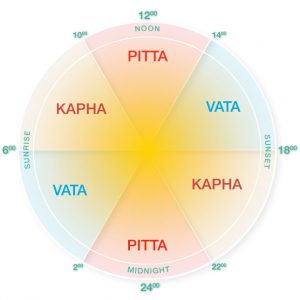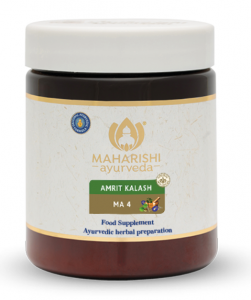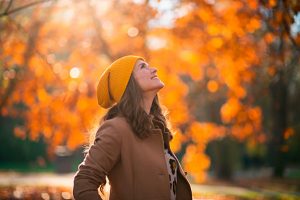The time when one season makes way for the next is also a transition period for the body, because our physiology adapts and reorients itself to the changing weather conditions. Therefore, our inner balance is more delicate and we are more susceptible to infections, especially when it’s cold, rainy and windy.
If there are other factors weakening the immune system, such as an unfavorable diet, stress, lack of sleep and insufficient periods for recuperation, our inner equilibrium is challenged and pathogens find their way in, especially via the upper respiratory tract.
In addition, there is the influence of the Doshas Vata, Pitta and Kapha, each of which exerts its particular influence at specific times of the year. In this connection, the rule is that a Dosha that has accumulated during one season can become a cause of disturbance during the following season.
During late fall and the transition to winter, especially Vata Dosha can accumulate, because just as cold and wind increase outside, there also tends to be more coolness and dryness in the body. This may make itself noticed, for example, in aching joints, restlessness, lighter sleep and digestive disorders.
To avoid this influence, Ayurveda recommends balancing accumulated Doshas during the transition to the next season.
Vata Dosha can be balanced with simple measures:
- Give preference to Vata-pacifying food, which tends to be moist, warm and oily. In winter, the physiology has a greater capacity to process fat such as Ghee, as long as the quality is good and we don’t take more than our individual digestive power can manage.
- The flavors sweet, sour and salty are most suitable, as they reduce Vata Dosha.
- Regularity in our daily routine, especially the sleep pattern and meal times, is very beneficial for Vata Dosha.
- Before showering in the morning, a nourishing full-body oil massage (Abhyanga) is recommended, as often as time permits. Oil is a wonderful antidote for excess Vata Dosha and nourishes the skin in a natural way. Very well-suited for balancing Vata Dosha is cured sesame oil.
- Substances that excite Vata Dosha, such as coffee, black tea and cold drinks, are to be avoided – as possible.
- Those habits can be replaced by drinking warming herbal teas and hot water. If you struggle with digestive complaints such as flatulence and bloating, you can boil the hot water with some added ginger, cumin, coriander and fennel seeds. This is a very tasty blend that promotes the intestinal functions in a gentle way.
Dosha predominance
around the clock
Well-protected during winter
When temperatures drop lower, our physiology responds by turning up the digestive fire (Agni): the body adjusts to the outside conditions by producing more warmth. Just as when you want to stir up the fire in a fireplace with a poker, our body also tries to activate the metabolism.
This is where food intake plays a big role. On the one hand, it is important to have nourishing food, so that Agni does not start eating the various body tissues (Dhatus); on the other hand, the food should not be so heavy that the capacity of your individual digestive power is exceeded and thus, Agni weakened.
For it is precisely when Agni is weak and out of balance that illnesses frequently arise, notably colds in winter.
Common colds of the respiratory tract are usually a sign of accumulated Kapha, especially when they are persistent and accompanied by thick mucus. Therefore, in winter, it’s best to refrain from:
- frequent snacking, which weakens Agni;
- too much of pastries and sweets;
- eating heavy food in the evening (rich in fat or with animal protein);
- taking food and drinks straight from the refrigerator;
- daytime naps longer than half an hour;
- lack of physical activity.
All of the above are factors that increase Kapha Dosha, leading to lethargy and susceptibility to infections.
More tips to stimulate the immune system effectively
In order to further support your immune system’s vitally important work, it can be very useful to provide the body with the best possible basis for an effective defense against disease by means of Ayurvedic preparations as well as extra vitamins and minerals.
Two Ayurvedic recipes
Amrit Kalash (“Ambrosia Chalice”) belongs to the class of what Ayurveda calls Rasayanas: foods that strengthen the immune system and have a balancing effect on the Doshas, as well as on the body tissues. It is rich in vitamin C and antioxidants. During winter time, you can take one heaped teaspoon in the morning and in the evening on an empty stomach as a preventive measure.
You can read more about this famous rasayana in our article Amrit Kalash – ‘Nectar of the Devas’.
Another valuable preparation is AyurImmune, which can also be taken to support the immune system during the cold season. If you are a person who usually catches a cold several times during winter, this product is particularly recommended as a preventive measure. It contains numerous plant components known and appreciated worldwide for their immune-strengthening effects, such as Tulsi and Neem.
A large range of Ayurvedic defense-boosting remedies exists, from which your Ayurvedic doctor can select the most suitable one for your individual situation during a personal consultation.
Vitamins and minerals
- Vitamin A builds up the mucous membrane and stimulates T-cell formation;
- Vitamin B complex – B vitamins support the task of immune cells to identify and fight viruses faster;
- Vitamin C supports the functioning of white blood cells and helps in the formation of antibodies (if diarrhea occurs, reduce the dose);
- Vitamin D, as capsules or drops – vitamin D is the door opener par excellence when it comes to an active immune system;
- Vitamin E supports the formation of antibodies;
- Zinc protects the mucous membrane and inhibits viruses from attaching and multiplying in the nasopharyngeal area.
(The correct dosage should be determined in consultation with a doctor.)
A little more about vitamin D, a very important factor for the functioning of the immune system:
Certain defense cells, the so-called T cells, are essential for fighting pathogens. Vitamin D plays a key role here and docks onto receptors on the surface of the T cells. This ensures activation and makes a strong immune response possible in the first place. If there is a vitamin D deficiency, the T cells lack the necessary stimulus to spring into action.
Numerous studies have demonstrated the positive effect of vitamin D on various disease processes. Especially in the case of corona infections, a sufficiently high vitamin D level plays a very important role and should definitely be considered.
This is a very inexpensive cure that can be taken year-round. It’s recommended to take vitamin D in liquid form, because it makes it very easy to adjust the dosage to one’s weight. Of course, it makes sense to have the level checked once a year and adjusted as needed. Today, this is even possible with home test kits.
As an extra measure, it’s possible to boost the immune response by means of a one to two-week high-dose vitamin cure. Nowadays, many people have unrecognized deficiencies due to an often rather one-sided diet and a general shortage of nutrients in the food, so that their immune system is not able to function normally in its full range. Therefore, replenishing the reserves can definitely make sense on many levels.
More tips for the cold days ahead
In addition to the above recommendations, winter time is also suitable on a mental and spiritual level, for contemplation and reflection on past days and manifestation of the future. To quiet the mind, meditation is probably the best-known and most effective means.
By now, the healing effect of meditation has been very well researched scientifically. A special role is played by the parasympathetic nervous system, which can be activated by meditation and this is one of the basic prerequisites for healing processes. Particularly impressive are the results of studies around Transcendental Meditation, which you may want to learn in Bad Ems, for example during a course of treatment.
A side-effect of regularly practicing TM is that it becomes easier to transition to a healthier lifestyle.
At the Maharishi Ayurveda Health and Seminar Center in Bad Ems, you can strengthen your own health in a holistic way during an in-residence cure or also receive advice as an outpatient.
The tranquil little town is located in Rhineland-Palatinate on both sides of the Lahn River. Its healing thermal springs and its architectural beauty have already inspired Russian tsars, Kaiser Wilhelm I, Johann Wolfgang von Goethe, Fyodor Dostoyevsky and Franz Liszt, to name a few illustrious guests.
Since July 2021, Bad Ems is on the UNESCO World Heritage List as one of the “Great Spa Towns of Europe”. This is the collective appellation for Bad Ems and ten other outstanding spas in Europe, including Karlsbad (Czech Republic), Vichy (France), Spa (Belgium) and Bath (Great Britain). It means that the spa town on the Lahn has received the highest international recognition.
Our health centre for Ayurvedic medicine, awarded many times over, is located in the Emperor wing of the 300-year-old and extensively renovated Häcker’s Grand Hotel on the banks of the Lahn, in the immediate vicinity of the historic theater, the casino and the spa gardens.
Download the article as a PDF file
© Maharishi Ayurveda Health Center Bad Ems



